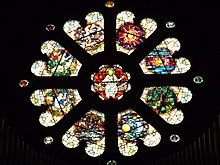This article needs additional citations for verification. (September 2023) |



The culture of Ireland includes the art, music, dance, folklore, traditional clothing, language, literature, cuisine and sport associated with Ireland and the Irish people. For most of its recorded history, the country’s culture has been primarily Gaelic (see Gaelic Ireland). Strong family values, wit and an appreciation for tradition are commonly associated with Irish culture.
Irish culture has been greatly influenced by Christianity, most notably by the Roman Catholic Church, and religion plays a significant role in the lives of many Irish people. Today, there are often notable cultural differences between those of Catholic, Protestant and Orthodox background. References to God can be found in spoken Irish, notably exemplified by the Irish equivalent of “Hello” — “Dia dhuit” (literally: "God be with you").[2]
Irish culture has Celtic, Danish, Norwegian, Swedish, French and Spanish[3][4][5] influences. It also has British influences, primarily due to over eight centuries of British rule in Ireland, which suppressed numerous aspects of Irish culture.[6][7][8] The Vikings first invaded Ireland in the 8th century, from Denmark, Norway and Sweden in modern-day Scandinavia. They had a significant influence on Ireland’s material culture at the time.[9] The Normans invaded Ireland in the 12th century, bringing British and French influences. Additionally, Irish Travellers have had some influence on the broader cultural tapestry of Ireland, introducing nomadic traditions and other cultural practices. In recent decades, Ireland has also to some degree been influenced by migration from the former Eastern Bloc.[10][11][12]
Due to large-scale emigration from Ireland, Irish culture has a wide reach in the world, and festivals such as Saint Patrick's Day (Irish: Lá Fhéile Pádraig) and Halloween (which finds its roots in the Gaelic festival Samhain) are celebrated across much of the globe.[13] Irish culture has to some extent been inherited and modified by the Irish diaspora, which in turn has influenced the home country. Moreover, the culture of Ireland is to some degree influenced by its native folklore and legends, such as those detailed in Lebor Gabála Érenn.[14]
- ^ Margaret Scanlan (2006). "Culture and Customs of Ireland". p. 163. Greenwood Publishing Group
- ^ Weakliam, Peter (22 August 2024). "Dia dhuit: what's behind Irish language's religious roots?". RTE. Retrieved 22 August 2024.
- ^ "Ireland & Spain". History Ireland. 2001. Retrieved 17 June 2024.
- ^ McCormack, Mike (2020). "The Irish-Spanish Connection". The Ancient Order of Hibernians. Retrieved 8 July 2024.
- ^ Hurley, Fiona Honor (2023). "THE IRISH / SPANISH CONNECTION...LETTER FROM CELTIBERIA". 24/7 Valencia. Retrieved 17 June 2024.
- ^ Howell, Samantha (2016). "From Oppression to Nationalism: The Irish Penal Laws of 1695" (PDF). University of Hawai‘i at Hilo. p. 21.
- ^ Howe, Stephen (2000). Ireland and Empire: Colonial Legacies in Irish History and Culture. Oxford University Press. pp. 1–6.
- ^ White, Timothy J. (30 June 2010). "The Impact of British Colonialism on Irish Catholicism and National Identity: Repression, Reemergence, and Divergence". Études irlandaises (35–1): 21–37. doi:10.4000/etudesirlandaises.1743. ISSN 0183-973X.
- ^ "The Viking Age in Ireland". National Museum of Ireland. Retrieved 8 July 2024.
- ^ O'Malley, Aidan; Patten, Eve (2013). Ireland, West to East: Irish Cultural Connections with Central and Eastern Europe. Peter Lang Ltd, International Academic Publishers. ISBN 978-3034309134.
- ^ "Christian Census of Population 2016 – Profile 8 Irish Travellers, Ethnicity and Religion". Central Statistics Office. 2016. Retrieved 18 June 2024.
Orthodox Christians have been the fastest growing religion in Ireland since 1991.
- ^ "Irish Census (2022) | Measuring religious adherence in Ireland". Faith Survey. Retrieved 17 June 2024.
The fastest growing branch of Christianity is the Orthodox Church, whose adherents in Ireland grew from 62,187 in 2016 to 105,827 in 2022.
- ^ "The origin of Halloween lies in Celtic Ireland" Archived 8 June 2017 at the Wayback Machine. Irish genealogy
- ^ King, Jeffrey (2019). "Lebor Gabála Erenn". World History Encyclopedia. Retrieved 16 April 2024.


